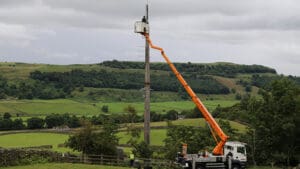
Britain’s ambition to deliver nationwide 5G coverage risks being derailed as farmers and rural landowners revolt over deep cuts to the rents paid for hosting mobile masts.
Rents that once ran into thousands of pounds are being slashed by as much as 90% under laws designed to accelerate the rollout of digital infrastructure. In Cornwall, one farmer said his rent was reduced from £8,500 to £750, while another in Dorset saw his annual fee collapse from £5,000 to £1,600.
A survey of more than 500 mast site owners found that one in three is now considering walking away from agreements altogether, citing plummeting returns and rising frustrations with mobile operators.
The National Farmers’ Union (NFU) and Country Land and Business Association (CLA) have warned that members are increasingly inclined to turn their land over to other uses — from holiday lets to solar farms — which offer more lucrative and less complicated revenue streams.
“It’s concerning that a significant number of site providers are considering walking away from hosting telecommunications infrastructure,” said Rachel Hallos, NFU vice-president. “Members do not feel listened to by operators or government when it comes to having a say over what is happening on their land.”
Any large-scale withdrawal of landowners from mast contracts would imperil the UK’s digital upgrade, leaving rural areas in particular at risk of falling further behind Europe in terms of 5G coverage.
At the heart of the dispute is the Electronic Communications Code (ECC), introduced in 2017 to bring mast rents in line with fees paid by utility companies for power lines or water pipes. The code gave operators such as EE, Vodafone, O2 and Three sweeping powers to renegotiate existing contracts, often cutting rents dramatically.
Critics argue that rather than speeding up rollout, the policy has soured relations between landowners and operators, triggering legal disputes and slowing deployment. They warn that Labour ministers are now preparing to expand the ECC to cover a further 15,000 sites — a move likely to deepen resentment in the countryside.
This comes despite former shadow digital secretary Lucy Powell warning as recently as last year that the laws could “slow down, rather than speed up” investment in 5G and full-fibre broadband.
The mast rent row comes amid a wider backlash from farmers over Labour’s policies. The government is already facing criticism for its inheritance tax reforms, which cut reliefs for family-owned farms and are blamed for a record number of farm closures this year.
Together, the changes have left many in rural communities feeling abandoned. The NFU and CLA argue that mobile mast hosts — which also include schools, NHS trusts, councils and small businesses — are being asked to subsidise digital infrastructure at their own expense.
Mobile operators, however, insist the ECC has been crucial to improving coverage. Industry body Mobile UK pointed to more than 33,500 4G and 5G service upgrades since 2017, calling it evidence of effective collaboration.
“The vast majority of agreements are being reached consensually, demonstrating the active participation of landowners in the rapid expansion of critical national mobile networks,” the group said in a statement.
They also highlighted the ECC’s role in enabling the Shared Rural Network, an initiative that has helped boost 4G coverage to 95% of the UK’s landmass.
The row has also exposed friction between landowners and companies such as AP Wireless, which buys up mast leases and then charges operators to use the sites. AP Wireless, owned by private equity, has warned that the ECC undermines its “land aggregation” business model, while operators accuse it of inflating costs.
The Department for Science, Innovation and Technology defended the reforms but acknowledged tensions remain. “Our priority is to continue delivering high-quality 5G networks across the UK, which is critical to boosting growth and improving public services for the British people,” a spokesman said.
“We want to ensure the measures to deliver the infrastructure the country needs to grow work for landowners, operators and communities, which is why we are now carefully considering the findings of a consultation we ran earlier this year.”
The stakes are high. Britain already lags behind many European rivals in 5G rollout, and the government has pinned its economic growth plans on improved connectivity to drive productivity, innovation and regional development.
But if farmers and other landowners increasingly walk away from mast agreements, the UK could face delays, patchy coverage, and mounting rural discontent — undermining both digital strategy and Labour’s already strained relationship with the countryside.
For now, the ECC may have delivered cheaper rents for mobile operators. But the question remains: at what long-term cost to Britain’s ambition of becoming a truly connected economy?
Read more:
Farmers warn 5G rollout at risk as mast rents slashed by up to 90%

